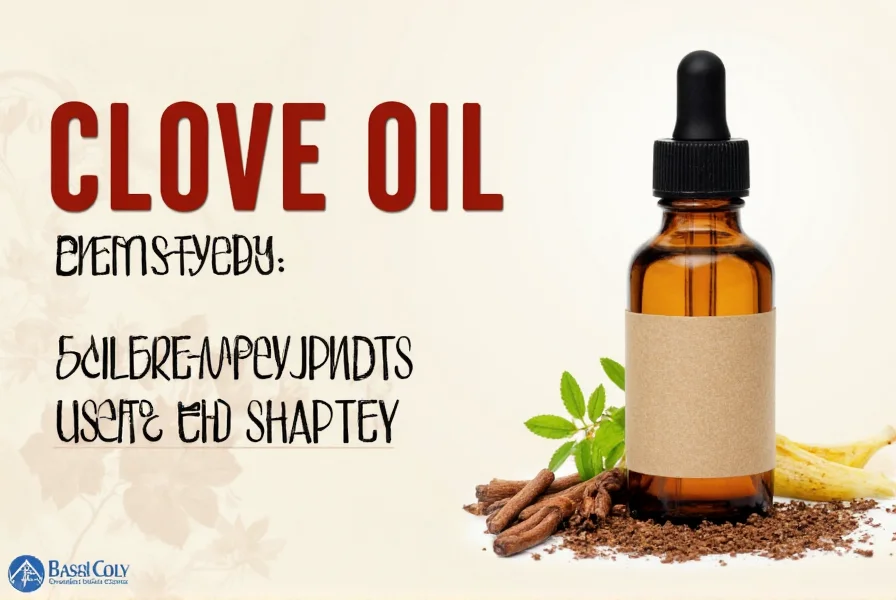Clove oil, extracted from Syzygium aromaticum flower buds, has been used for centuries in traditional medicine. Modern research validates several specific applications where this essential oil demonstrates measurable benefits, particularly due to its high eugenol content (70-90%). Understanding what clove oil is good for requires examining evidence-based uses rather than anecdotal claims.
Scientifically Supported Benefits of Clove Oil
Unlike many essential oils with limited research, clove oil has several well-documented applications supported by clinical studies. The key is understanding which uses have scientific backing versus those promoted without evidence.
Dental Pain Management
One of the most well-established uses of clove oil is for temporary toothache relief. A 2006 study published in the Journal of Dentistry found that clove oil provided pain relief comparable to benzocaine, a common topical anesthetic used in dentistry. The eugenol in clove oil works by numbing nerve endings and reducing inflammation in the affected area.
When using clove oil for dental discomfort:
- Dilute properly (1 part clove oil to 10 parts carrier oil)
- Apply with cotton swab directly to the affected area
- Use temporarily until you can see a dental professional
Antimicrobial Properties
Research demonstrates clove oil's effectiveness against certain bacteria and fungi. A 2018 review in Frontiers in Microbiology highlighted its broad-spectrum antimicrobial activity. What clove oil is good for in this context includes:
| Microorganism | Effectiveness | Research Status |
|---|---|---|
| Staphylococcus aureus | Moderate inhibition | In vitro studies |
| Candida albicans | Strong inhibition | Multiple studies |
| Escherichia coli | Variable results | Limited evidence |
These properties make diluted clove oil potentially useful for minor skin infections when properly applied, though it should never replace prescribed antimicrobial treatments for serious infections.
Natural Anti-inflammatory Effects
The eugenol in clove oil inhibits inflammatory pathways in the body. A 2014 study in European Journal of Dentistry showed significant reduction in inflammation markers when clove oil was applied topically. This explains why many people find relief from minor joint discomfort using properly diluted clove oil preparations.
Safe Usage Guidelines for Clove Oil
Understanding what clove oil is good for requires equal attention to proper usage. Undiluted clove oil can cause chemical burns and other adverse effects. Safety considerations include:
- Dilution ratio: Always dilute to 1-2% concentration for topical use (1-2 drops per teaspoon of carrier oil)
- Patch testing: Test on small skin area before broader application
- Duration: Limit continuous use to no more than 7-10 days
- Contraindications: Avoid if taking blood thinners or before dental surgery

Limitations and What Research Doesn't Support
Despite popular claims, research does not support clove oil for several commonly suggested uses. It's important to distinguish between evidence-based applications and unsupported claims when considering what clove oil is good for.
Applications lacking scientific evidence include:
- Curing serious infections without medical supervision
- Treating chronic medical conditions like diabetes
- Significant weight loss assistance
- Replacing prescribed medications for heart conditions
A 2020 systematic review in Complementary Therapies in Medicine concluded that while clove oil shows promise for specific applications like dental pain and minor antimicrobial uses, evidence for many other claimed benefits remains preliminary.
Safety Considerations and When to Avoid Clove Oil
Clove oil is generally safe when used properly, but certain situations require caution or avoidance:
- Children: Not recommended for children under 2 years
- Pregnancy: Avoid during first trimester; consult healthcare provider
- Oral surgery: Discontinue use at least 2 weeks before procedures
- Existing conditions: Use caution with bleeding disorders or liver conditions
Always consult with a healthcare provider before using clove oil for medical purposes, especially if you have underlying health conditions or take prescription medications. What clove oil is good for should never replace professional medical advice for diagnosed conditions.
Evidence-Based Applications Summary
When evaluating what clove oil is good for, focus on applications with scientific support:
- Temporary relief of dental pain (most evidence-supported use)
- Topical antimicrobial applications for minor skin issues
- Reducing inflammation in minor joint discomfort
- Antioxidant properties when used in appropriate concentrations
Remember that essential oils like clove oil are complementary approaches, not replacements for medical treatment. The quality of clove oil matters significantly—look for 100% pure, therapeutic-grade oil from reputable suppliers when considering what clove oil is good for in your wellness routine.










 浙公网安备
33010002000092号
浙公网安备
33010002000092号 浙B2-20120091-4
浙B2-20120091-4